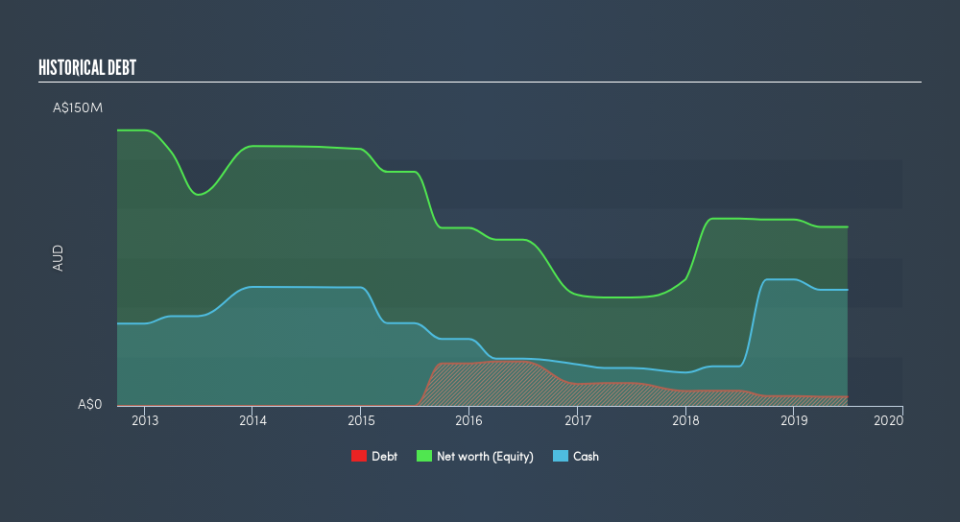Buru Energy (ASX:BRU) Has Debt But No Earnings; Should You Worry?

Legendary fund manager Li Lu (who Charlie Munger backed) once said, 'The biggest investment risk is not the volatility of prices, but whether you will suffer a permanent loss of capital.' When we think about how risky a company is, we always like to look at its use of debt, since debt overload can lead to ruin. Importantly, Buru Energy Limited (ASX:BRU) does carry debt. But the more important question is: how much risk is that debt creating?
What Risk Does Debt Bring?
Debt and other liabilities become risky for a business when it cannot easily fulfill those obligations, either with free cash flow or by raising capital at an attractive price. Ultimately, if the company can't fulfill its legal obligations to repay debt, shareholders could walk away with nothing. While that is not too common, we often do see indebted companies permanently diluting shareholders because lenders force them to raise capital at a distressed price. Of course, the upside of debt is that it often represents cheap capital, especially when it replaces dilution in a company with the ability to reinvest at high rates of return. When we think about a company's use of debt, we first look at cash and debt together.
View our latest analysis for Buru Energy
How Much Debt Does Buru Energy Carry?
The image below, which you can click on for greater detail, shows that Buru Energy had debt of AU$4.61m at the end of June 2019, a reduction from AU$7.69m over a year. However, it does have AU$58.8m in cash offsetting this, leading to net cash of AU$54.1m.
How Healthy Is Buru Energy's Balance Sheet?
We can see from the most recent balance sheet that Buru Energy had liabilities of AU$12.6m falling due within a year, and liabilities of AU$7.49m due beyond that. Offsetting this, it had AU$58.8m in cash and AU$974.0k in receivables that were due within 12 months. So it actually has AU$39.7m more liquid assets than total liabilities.
This surplus strongly suggests that Buru Energy has a rock-solid balance sheet (and the debt is of no concern whatsoever). On this basis we think its balance sheet is strong like a sleek panther or even a proud lion. Simply put, the fact that Buru Energy has more cash than debt is arguably a good indication that it can manage its debt safely. The balance sheet is clearly the area to focus on when you are analysing debt. But it is future earnings, more than anything, that will determine Buru Energy's ability to maintain a healthy balance sheet going forward. So if you're focused on the future you can check out this free report showing analyst profit forecasts.
Over 12 months, Buru Energy reported revenue of AU$18m, which is a gain of 3.4%. That rate of growth is a bit slow for our taste, but it takes all types to make a world.
So How Risky Is Buru Energy?
By their very nature companies that are losing money are more risky than those with a long history of profitability. And the fact is that over the last twelve months Buru Energy lost money at the earnings before interest and tax (EBIT) line. And over the same period it saw negative free cash outflow of AU$10m and booked a AU$5.4m accounting loss. With only AU$59m on the balance sheet, it would appear that its going to need to raise capital again soon. Even though its balance sheet seems sufficiently liquid, debt always makes us a little nervous if a company doesn't produce free cash flow regularly. For riskier companies like Buru Energy I always like to keep an eye on whether insiders are buying or selling. So click here if you want to find out for yourself.
Of course, if you're the type of investor who prefers buying stocks without the burden of debt, then don't hesitate to discover our exclusive list of net cash growth stocks, today.
We aim to bring you long-term focused research analysis driven by fundamental data. Note that our analysis may not factor in the latest price-sensitive company announcements or qualitative material.
If you spot an error that warrants correction, please contact the editor at editorial-team@simplywallst.com. This article by Simply Wall St is general in nature. It does not constitute a recommendation to buy or sell any stock, and does not take account of your objectives, or your financial situation. Simply Wall St has no position in the stocks mentioned. Thank you for reading.

 Yahoo Finance
Yahoo Finance 
